BusinessEurope Headlines No. 2018-15
Long-term economic growth is the answer to today’s challenges

“Despite the positive evolution of the economic situation in Europe and the implementation of important reforms in some EU Member States, factors of uncertainty remain for Italy, our continent and the whole world. Europe’s long-term growth potential only reaches 1.3%, which is way below the current cyclical level of some 2%. Protectionism and populism are still potentially destabilising issues. The relations between large economic powers such as the EU, the US and China are entering a new era. Companies need certainty and time to prepare and adjust to the post-Brexit situation and time pressure is rising”, stated Emma Marcegaglia, President of BusinessEurope, at the Ambrosetti Club in Milan on 19 April 2018. Asked about the real perspectives of the economy and industry, President Marcegaglia stressed that “to increase long-term economic growth, we must continue our reform efforts, pursue an ambitious trade policy, develop our Single Market, complete our Digital Single Market and increase the attractiveness of Europe as an investment location”. Moreover, she added, in order to show that the EU is serious about industrial policy, “the decisions on investments in research and innovation in the next Multiannual Financial Framework negotiations will be key. We need a substantial increase of the EU budget on research and innovation and a decision on the new Multiannual Financial Framework before the European elections”.
Contact: Daniele Olivieri
Our comment
EU Research and Innovation Programme: 33%, what is next?
By Alexandre Affre, Director Industrial Affairs
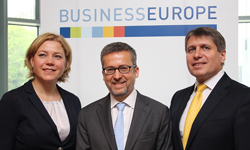 Europe does not need less, but more industrial research and innovation. The next EU framework programme (so-called FP9) is only one, but a very important piece of the EU puzzle that will foster more public and private investments in the years to come. I am not sure that putting into question the “industrial leadership” pillar that currently exists in Horizon 2020 is the right signal. Even if industry participation is already mainstreamed across the full programme, the pillar is the anchor point that gives certainty of an industry-led thinking. Companies across Europe are strongly committed to making the FP9 a success, the ball is now the camp of policy-makers.
Europe does not need less, but more industrial research and innovation. The next EU framework programme (so-called FP9) is only one, but a very important piece of the EU puzzle that will foster more public and private investments in the years to come. I am not sure that putting into question the “industrial leadership” pillar that currently exists in Horizon 2020 is the right signal. Even if industry participation is already mainstreamed across the full programme, the pillar is the anchor point that gives certainty of an industry-led thinking. Companies across Europe are strongly committed to making the FP9 a success, the ball is now the camp of policy-makers.
Thirty-three per cent is the level of participation of industry in the EU flagship Framework Programme for Research and Innovation Horizon 2020 so far. This programme mobilises nearly €80 billion for first-class projects over the 2014-2020 period. After a drop since the 4th framework programme in the 90’s (*), the level of participation of industry is finally going up. Is it not playing with fire to remove the “industrial leadership” pillar from it? What will be the impact on the percentage of industry participation?
Investing in research and innovation is in the DNA of industry. Managers, researchers and engineers from companies are permanently thinking out of the box to reinvent business models, to make the plants more efficient and to develop new technologies, products and solutions. These new technologies and solutions one day in a way or another impact the daily life of citizens. Think about all innovations that industry bring over the last decades in the field of communication, health, transport or energy. Industrial innovation is essential to address our societal challenges.
For more than a year already, BusinessEurope has been engaging into the public debate on how to best design FP9 to make it impactful. Earlier this week, we organised a breakfast debate with a number of Members of the European Parliament (MEPs) and Carlos Moedas, EU Commissioner for Research, Science and Innovation. The level of attendance has shown once more the high level of expectations from the EU business community. Pictures.
(*) share of industry participation in the successive framework programmes: FP4 (39%), FP5 (29%), FP6 (31%), FP7 (25%), H2020 (33% so far).
Contact: Alexandre Affre
Video message on international trade relations
Watch comments by our Director General Markus J. Beyrer and Director for International Relations Luisa Santos on current trade relations with the USA and Japan.
China can and should be part of the solution to a looming trade war
 “The best way to improve EU-China relations is by negotiating and concluding the Comprehensive Agreement on Investment between the EU and China. At the same time the best way to address global concerns over China’s economy is China’s implementation of the reforms it announced in State Council documents No. 5 and 39 and in President Xi’s recent Bo’ao speech,” Director General of BusinessEurope Markus J. Beyrer told to Chinese Vice-Minister and International Trade Representative Fu Ziying during the meeting at BusinessEurope. Despite the recent investment negotiations and China’s own promises for reform, the business environment for foreign companies in China has become more challenging over time. China’s new cybersecurity legislation, the inclusion of party cells in foreign and private enterprises and continued joint venture requirements are some of the challenges European companies face in China. Both sides agreed, however, that recent unilateral action by the US to address these and other issues is a problematic development and possibly in violation of WTO law. Beyrer ended the meeting by encouraging China to be part of the solution by being a partner within and contributor to the multilateral trading system in key areas such as WTO reform and the creation of additional rules in areas like digital trade, state aid, subsidies and investment.
“The best way to improve EU-China relations is by negotiating and concluding the Comprehensive Agreement on Investment between the EU and China. At the same time the best way to address global concerns over China’s economy is China’s implementation of the reforms it announced in State Council documents No. 5 and 39 and in President Xi’s recent Bo’ao speech,” Director General of BusinessEurope Markus J. Beyrer told to Chinese Vice-Minister and International Trade Representative Fu Ziying during the meeting at BusinessEurope. Despite the recent investment negotiations and China’s own promises for reform, the business environment for foreign companies in China has become more challenging over time. China’s new cybersecurity legislation, the inclusion of party cells in foreign and private enterprises and continued joint venture requirements are some of the challenges European companies face in China. Both sides agreed, however, that recent unilateral action by the US to address these and other issues is a problematic development and possibly in violation of WTO law. Beyrer ended the meeting by encouraging China to be part of the solution by being a partner within and contributor to the multilateral trading system in key areas such as WTO reform and the creation of additional rules in areas like digital trade, state aid, subsidies and investment.
Contact: Maurice Fermont
EU Company law to focus on enablers for a healthy business environment
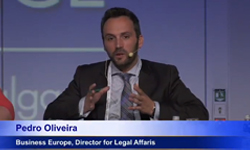 In the last years businesses faced a heavy stream of regulation pouring from Brussels affecting many dimensions of companies’ operations. The time has come to work on enablers to entrepreneurial activity in the EU. These messages were voiced by Pedro Oliveira, Legal Director at BusinessEurope at the 22nd European Corporate Governance and Company Law Conference in Sofia, on 19 April. He highlighted that BusinessEurope has big hopes that the future company law package will help facilitate the use of digital tools throughout a company’s lifecycle and ensure that companies can fully exercise their freedom of establishment in the EU single market. “Progress is also needed on the restructuring and second chance proposal as we need to help those businesses that face difficulties along the path of success”, Oliveira stated.
In the last years businesses faced a heavy stream of regulation pouring from Brussels affecting many dimensions of companies’ operations. The time has come to work on enablers to entrepreneurial activity in the EU. These messages were voiced by Pedro Oliveira, Legal Director at BusinessEurope at the 22nd European Corporate Governance and Company Law Conference in Sofia, on 19 April. He highlighted that BusinessEurope has big hopes that the future company law package will help facilitate the use of digital tools throughout a company’s lifecycle and ensure that companies can fully exercise their freedom of establishment in the EU single market. “Progress is also needed on the restructuring and second chance proposal as we need to help those businesses that face difficulties along the path of success”, Oliveira stated.
Contact: Pedro Oliveira
European Parliament hearing on the future of VAT
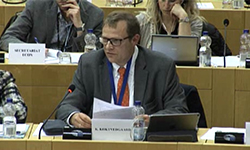 ‘Charging VAT on cross-border trade between businesses will significantly increase compliance costs as businesses will have to be continuously informed about the wide range of different VAT rates in the different Member States,’ this was the key message of Kristian Koktvedgaard, Chair of the VAT Policy Group at BusinessEurope, to Members of the European Parliament’s Economic and Monetary Affairs Committee. At the European Parliament’s hearing entitled ‘Towards a Definitive EU VAT system’ held on 24 April, which included interventions from rapporteur Jeppe Kofod MEP and Maria Elena Scoppio (DG TAXUD), Kristian Koktvedgaard also expressed his support for the European Commission’s efforts to further improve and broaden the One-Stop-Shop (OSS), which would be the most important simplification measure for businesses, especially for SMEs.
‘Charging VAT on cross-border trade between businesses will significantly increase compliance costs as businesses will have to be continuously informed about the wide range of different VAT rates in the different Member States,’ this was the key message of Kristian Koktvedgaard, Chair of the VAT Policy Group at BusinessEurope, to Members of the European Parliament’s Economic and Monetary Affairs Committee. At the European Parliament’s hearing entitled ‘Towards a Definitive EU VAT system’ held on 24 April, which included interventions from rapporteur Jeppe Kofod MEP and Maria Elena Scoppio (DG TAXUD), Kristian Koktvedgaard also expressed his support for the European Commission’s efforts to further improve and broaden the One-Stop-Shop (OSS), which would be the most important simplification measure for businesses, especially for SMEs.
![]()
![]() Contact: Pieter Baert
Contact: Pieter Baert
Stakeholder views on Better Regulation in Council
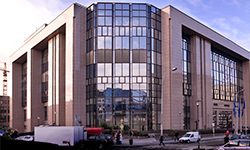 On 24 April, Jens Hedström, Chair of BusinessEurope’s Better Regulation Working Group, and Martynas Barysas, BusinessEurope Director of Internal Market Department, presented a stakeholder view on the Better Regulation agenda during a meeting of the Council Working Party on Better Regulation. Hedström stressed in particular the importance of evidence-based decision-making and burden-reduction for businesses. He also shared some experiences from BusinessEurope’s participation in the REFIT platform. Barysas elaborated on Impact Assessments and underlined the importance of both impact assessment scrutiny by the Regulatory Scrutiny Board that is crucial to achieve quality as well as additional Impact Assessments by the Council and the European Parliament when substantive amendments are introduced to a legislative proposal in the course of negotiations. The presentation was received positively by a big number of national representatives, who reacted with comments and questions. The Member States expressed their interest in continued cooperation with BusinessEurope at this level.
On 24 April, Jens Hedström, Chair of BusinessEurope’s Better Regulation Working Group, and Martynas Barysas, BusinessEurope Director of Internal Market Department, presented a stakeholder view on the Better Regulation agenda during a meeting of the Council Working Party on Better Regulation. Hedström stressed in particular the importance of evidence-based decision-making and burden-reduction for businesses. He also shared some experiences from BusinessEurope’s participation in the REFIT platform. Barysas elaborated on Impact Assessments and underlined the importance of both impact assessment scrutiny by the Regulatory Scrutiny Board that is crucial to achieve quality as well as additional Impact Assessments by the Council and the European Parliament when substantive amendments are introduced to a legislative proposal in the course of negotiations. The presentation was received positively by a big number of national representatives, who reacted with comments and questions. The Member States expressed their interest in continued cooperation with BusinessEurope at this level.
![]() Contact: Basje Bender
Contact: Basje Bender
Joint declaration on SME programme in the next Multiannual Financial Framework
 The national SME Envoys, whose role is to promote the modernisation of national and European policies for small and medium-sized enterprises (SMEs), have issued a declaration stressing the need to maintain a visible, dedicated, stand-alone SME programme within the next Multiannual Financial Framework (MFF). BusinessEurope has co-signed and endorsed this declaration, which underlines in particular the benefits that the COSME Programme (the EU Programme for the competitiveness of SMEs) generates for SMEs under the current MFF. The SME component of the future MFF should build on proven measures as well as set new impulses, in particular in the fields of digital transformation and internationalisation of businesses and ecosystems. The declaration has been handed over to European Commissioner for Internal Market, Industry, Entrepreneurship and SMEs, Elżbieta Bieńkowska on 17 April.
The national SME Envoys, whose role is to promote the modernisation of national and European policies for small and medium-sized enterprises (SMEs), have issued a declaration stressing the need to maintain a visible, dedicated, stand-alone SME programme within the next Multiannual Financial Framework (MFF). BusinessEurope has co-signed and endorsed this declaration, which underlines in particular the benefits that the COSME Programme (the EU Programme for the competitiveness of SMEs) generates for SMEs under the current MFF. The SME component of the future MFF should build on proven measures as well as set new impulses, in particular in the fields of digital transformation and internationalisation of businesses and ecosystems. The declaration has been handed over to European Commissioner for Internal Market, Industry, Entrepreneurship and SMEs, Elżbieta Bieńkowska on 17 April.
Contact: Daniel Cloquet
Discussing IP and circulation of foreign judgements in the European Parliament
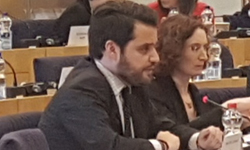 On 24 April 2018, BusinessEurope Senior Adviser Ilias Konteas spoke at a public hearing in the European Parliament Legal Affairs Committee on the possible inclusion of intellectual property rights in the scope of the negotiated Hague Convention on the recognition and enforcement of foreign judgements. BusinessEurope does not support the inclusion of at least patents, trademarks and designs. Given the complexity of intellectual property law, there is strong concern on unintended consequences. European business sees limited benefit from inclusion but much greater uncertainty, legal costs and risk associated with all intellectual property enforcement activities.
On 24 April 2018, BusinessEurope Senior Adviser Ilias Konteas spoke at a public hearing in the European Parliament Legal Affairs Committee on the possible inclusion of intellectual property rights in the scope of the negotiated Hague Convention on the recognition and enforcement of foreign judgements. BusinessEurope does not support the inclusion of at least patents, trademarks and designs. Given the complexity of intellectual property law, there is strong concern on unintended consequences. European business sees limited benefit from inclusion but much greater uncertainty, legal costs and risk associated with all intellectual property enforcement activities.
Contact: Ilias Konteas
Mind the impact of new capital requirements for banks
 New capital requirements should not increase financing problems for companies, discourage trade finance and the use of hedging instruments, BusinessEurope Director General Markus J. Beyrer wrote to the European Commission Vice-President Valdis Dombrovskis, as well as to representatives of the EU Member States and the European Parliament. BusinessEurope made some suggestions to mitigate possible negative impacts on financing and hedging.
New capital requirements should not increase financing problems for companies, discourage trade finance and the use of hedging instruments, BusinessEurope Director General Markus J. Beyrer wrote to the European Commission Vice-President Valdis Dombrovskis, as well as to representatives of the EU Member States and the European Parliament. BusinessEurope made some suggestions to mitigate possible negative impacts on financing and hedging.
![]() Contact: Erik Berggren
Contact: Erik Berggren
Calendar
- 1 May: U.S. decision on steel sanctions
- 2 May: MFF post-2020 proposal
- 9 May: Europe Day